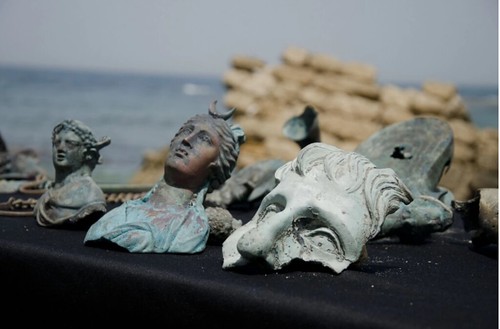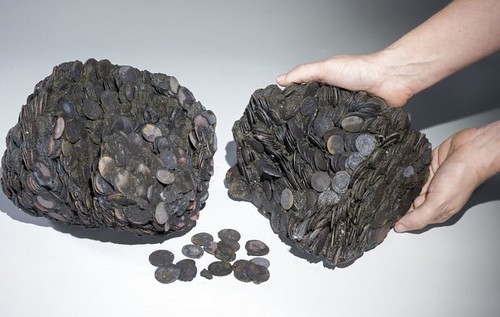
PREV ARTICLE
NEXT ARTICLE
FULL ISSUE
PREV FULL ISSUE
COINS AMONG STUNNING FIND AT ISRAELI PORT
The Washington Post was among many publications reporting this stunning find of a 1,700-year-old Roman shipwreck. -Editor

For Ran Feinstein and Ofer Ra'anan, two friends on a diving trip off of the Israeli coast, what began as a typical Mediterranean excursion took a stunning turn. The two men spied a castaway sculpture sitting amid the rocks and silt on the seabed. This was no average oceanic detritus. The figure, it started to dawn on the divers, must have been ancient. Indeed, according to the archaeologists, it's the largest cache of Roman objects to be found in Israel in 30 years. “It took us a couple of seconds to understand what was going on,” Ra'anan told the Associated Press. The duo realized the sculpture wasn't alone — this spot was rife with hoary items. They had found the remnants of a Roman merchant ship, lost at sea some 1,600 years ago near Caesarea, a harbor city perched on the Israeli coast roughly 30 miles north of Tel Aviv. Recognizing the artifacts belonged in a museum, or were at the very least covered by Israel's Law of Antiquities, the divers contacted the state-run Antiquities Authority. When the government archaeologists arrived at the site, what they beheld almost defied belief: a bronze lamp featuring Sol, the sun deity; several iron anchors; a statue of moon goddess Luna; jugs for drinking fresh water at sea; a whale figurine; and an item the Antiquities Authority described in a news release as a “bronze faucet in the form of a wild boar with a swan on its head.”
The find is remarkable for two reasons, the archaeologists say. First, the objects are well-preserved and were only recently exposed on the ocean floor. Covered in a layer of sand, the figures and coins show little evidence of the nearly 2,000 years that have passed. And second, because the Romans frequently melted down metal statues to recast them anew, few such figures exist today. The accident was, ultimately, the artifacts' salvation.“Because these statues were wrecked together with the ship,” Sharvit and Dror said, “they sank in the water and were thus ‘saved' from the recycling process.” To read the complete article, see:
Robert Hoge sent this Fox News Science article. thanks. -Editor

To read the complete article, see:
Wayne Homren, Editor The Numismatic Bibliomania Society is a non-profit organization promoting numismatic literature. See our web site at coinbooks.org. To submit items for publication in The E-Sylum, write to the Editor at this address: whomren@gmail.com To subscribe go to: https://my.binhost.com/lists/listinfo/esylum All Rights Reserved. NBS Home Page Contact the NBS webmaster 
|
